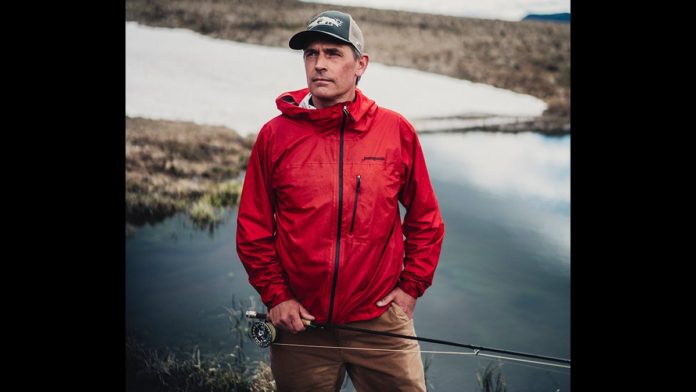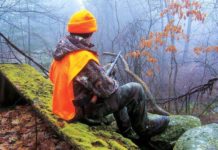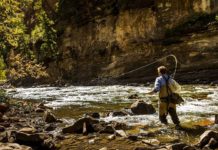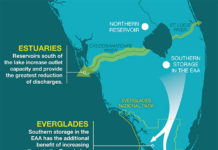Martin Heinrich, a Democratic Senator from New Mexico, is a passionate hunter and conservationist. Recently honored by Ducks Unlimited with the Wetlands Conservation Achievement Award, Heinrich has become widely recognized as one of the most influential conservation leaders in national politics today. He played a significant role in crafting the passage of America’s Conservation Enhancement Act, which reauthorized and increased funding to the North American Wetlands Conservation Act, the National Fish and Wildlife Foundation, and the Chesapeake Bay Program. He was also a champion of the Great American Outdoors Act (GAOA), which dedicated a whopping $900 million annually to the Land and Water Conservation Fund—one of the biggest conservation wins in recent memory. Now, Senator Heinrich has turned his sights toward implementing several new initiatives that have the potential to significantly impact the future of hunting and fishing in the United States.
Senator Heinrich has long worked towards conservation goals. He grew up primarily in Missouri before moving to New Mexico as an adult. There, he joined the AmeriCorps, where he worked for the U.S. Fish and Wildlife Service on the restoration of Mexican gray wolves. He then served as the executive director for the Cottonwood Gulch Foundation—a nonprofit dedicated to teaching young people about nature and conservation, before entering politics.
Heinrich currently serves as a co-chair of the Congressional Sportsmen’s Caucus, a bipartisan group of politicians that champions and protects the rights of sportsmen. Heinrich is working on guiding the Recovering America’s Wildlife Act through the Senate. The bill recently passed the Senate Environment and Public Works Committee and is primed to be taken up by the full Senate. If passed, it would provide billions toward habitat restoration and boosting threatened wildlife populations, prompting the Theodore Roosevelt Conservation Partnership to say it could be “the most impactful wildlife conservation investment in U.S. history.”
When Senator Heinrich isn’t pushing landmark conservation bills through Congress, he’s spending time in the field. In the summer, you can find him fly fishing for Rio Grande cutthroat trout. Come fall, he heads to the mountains to chase elk. We recently sat down with Senator Heinrich to discuss the most pressing issues facing hunters and anglers today, the recent controversy over how to manage predator populations, gun rights, and more.
How did you get into hunting?
I’m largely an adult-onset hunter. When I was younger, I did competitive archery. I tried to get into hunting but was unsuccessful because I didn’t have a mentor. When I was in my mid- to late-20s, I got into growing my own food. Hunting was the natural next step. What was different was that through conservation work, I’d gotten to know a couple of passionate hunters. The ability to learn from them changed everything for me. Hunting quickly became one of the central activities I organize my life around.
What was your first hunt?
I tried to hunt for deer and turkey growing up, mostly with archery gear. But when I got into it successfully later in life, it was elk. It was actually a lucky once-in-a-lifetime draw for the Valle Vidal, which makes you think things are easier than they actually are. But it was just an amazing experience and from there, every year, if I can draw a tag—or several tags—elk hunting really dominates my fall.
What do you love most about hunting?
You are living in the present, and you’re hyper-aware of what’s going on in the natural world around you. That’s a very different way to relate to a landscape than, say, hiking, where you tend to be loud and don’t see a lot of wildlife because they hear you coming. When you’re hunting, you see things happening in nature that you would never otherwise.
Turning to your experience in politics, would you say that hunters are well-represented by politicians in Washington D.C.?
Generally, there are just fewer sportsmen in both parties than there used to be. That said, for those of us who are passionate about this, it opens up a lot of opportunities for the two parties to work together to find common ground to actually get things done.
Have you found there to be any big misconceptions about hunting—or hunters—among your peers in D.C. that you’ve had to clear up?
One of the things that I do is host wild game dinners for colleagues—and expose them to the whole food side of the equation. All some of them know about hunting is a head on a wall. That’s completely different from being exposed to hunting through the fellowship of a really great meal. Sharing wild game helps people to understand the side of hunting that’s so important to many of my constituents and me.
I know you supported the fight for public stream access in New Mexico, and the state’s supreme court recently ruled in favor of public access—a big win for anglers. Public access is an important issue for you. If you could do one thing to improve public access for hunters and anglers nationwide, what would it be?
It would be to use the progress that we made around the Great American Outdoors Act (GAOA) to solve our most vexing access challenges. Probably every Senator—and at least, every Western Senator—has a place in their state where there’s public land or waters that are either impossible or really hard for the public to get to. By fully funding the Land and Water Conservation Fund as a tool to specifically solve those access problems, there’s so much we can accomplish that would be broadly enjoyed by the American people.
I’ll give you an example. The Sabinoso Wilderness in northeast New Mexico is a place where there used to be literally no legal means of access. By using the Land and Water Conservation Fund and working with a broad array of advocates, we now have two different access points. People are really excited about that, and I’m sure it gets replicated in state after state.
I understand that you’re pushing through the Recovering America’s Wildlife Act (RAWA), which seems like it could have a really meaningful impact on conservation by funneling resources to state wildlife agencies. What led you to introduce the legislation?
A couple of things. For one, we saw what was possible when we passed GAOA. I think of RAWA as the GAOA for wildlife. We were able to get GAOA done in part because, during COVID, people really came to appreciate their open spaces. This opened up a way to work on the outdoors in a bipartisan way. We’re trying to build on that momentum to have a big bipartisan win around wildlife.
When I look back a hundred years or so at early conservationists, like Aldo Leopold, they were able to reverse the declines of species like elk, whitetail deer, and geese by putting their money where their mouths were. They created acts like the Pittman-Robertson Act and later, the Dingell-Johnson Act. I realized that to make a real impact on species that are in slow but very clear decline, you have to bring resources to the table.
Where will the funding from RAWA come from?
Natural resource damages. For example, a court case about pollution where there’s a settlement because there was damage to the natural world. We capture some of the money from those settlements and dedicate it to conservation. I’d love to take credit for this, but it was really Senator Roy Blunt’s (R-Missouri) idea. It’s one of the reasons we have so many people supporting the legislation.
Another bill that you’re working on getting passed is the Good Samaritan Remediation of Abandoned Hardrock Mines Act. On its face, it doesn’t seem like it will impact hunting and fishing all that much, and yet, a lot of conservation groups connected to the industry are applauding the legislation. How exactly will the bill impact outdoorsmen?
The high country in places like northern New Mexico, southern Colorado, and Montana, all went through unregulated mining booms over a hundred years ago. A lot of places never got cleaned up. If you look at the Red River in northern New Mexico, there was a time when it wouldn’t support trout. If you’re able to fix the sources of that pollution and heavy metals that hold back some of our best alpine streams, suddenly you create new miles of fishing. By cleaning up old, abandoned mines, you can directly create new habitat for cutthroat trout.
I understand that you used to work with the U.S. Fish and Wildlife Service as part of Americorps on the Mexican Gray Wolf Recovery. What are your initial thoughts on a federal judge’s surprising decision to relist gray wolves in the Midwest and parts of the West?
Generally speaking, politics and wildlife management don’t mix well. We need to create a system where those decisions are made based on science to the extent that we can. Politicians and judges can both be guilty of ignoring science. Decisions made by the agencies that actually manage wildlife tend to be better.
Do you think that there needs to be legislation to strengthen the power that the U.S. Fish and Wildlife Service has to make these determinations and prevent future judicial reversals?
The system is generally set up well to make those decisions now. It’s when individual interest groups and political voices get involved that it strays into other venues. By giving resources to our state and federal game agencies to do recovery work based on science, we can get away from more politically driven decisions.
The debate over wolf management gets at the divide between environmental groups and conservation groups. Is it still possible for environmentalists and conservationists to get stuff done on shared goals?
It is. There is no question about that. We’re able to get stuff done when we build big, broad coalitions that had a lot of different voices and perspectives but can agree on a goal. That’s one of the reasons I’m optimistic about RAWA. We have such a broad coalition from agricultural interests to hunters and anglers to environmental groups that all agree that this is a problem—and we have a solution for it.
Members of the Democratic Party often advocate for increasing restrictions on gun ownership, which can make some hunters wary of supporting Democratic candidates. You’ve disavowed the NRA after once being a member. Is it fair or unfair for hunters to be wary of supporting Democrats?
The reason people are afraid of restrictions is there’s been this cycle of fear among organizations like the NRA and to some degree, industry participants. We should celebrate the use of firearms in sports like hunting, in particular, and call into question the type of gun culture that we saw on January 6, 2021. There is the mainstream gun culture that I grew up around and am proud to be a part of, but I’ve also seen a really radical and irresponsible gun culture. Those are two different things. The more that we embrace one and turn away from the other, the better. Anyone that’s had to go to a Sportsman’s Warehouse and go through a background check for a hunting rifle knows that the 10 or 15 minutes it takes isn’t the end of the world or a slippery slope.
So, do you think the logic of the “slippery slope” argument is broken?
There is such a broad swath of the American public that uses guns. Generally, purist arguments are not reflective of the reality of a democracy. We’re not going to take away peoples’ free speech in this country but yet, you can’t go into a theater and yell ‘fire!’ There are some limitations on the all of the rights articulated in the constitution based on where your freedom ends and where you start hurting another person. We just need to get out of the hyperbolic, theoretical world and talk about these things in real-life applications. There’s an awful lot of middle ground and common sense that can be applied.
Are there any solutions to mitigating the effects of drought on wildlife in the West?
I’m trying to figure that out. I don’t have an easy solution, and I suspect that if there had been one, we’d have come by it already. However, there are some specific things that we’re working on with respect to New Mexico that have to do with how we manage watersheds. Historically, when we’ve created water infrastructure, you would build a dam only for flood control or only for irrigation. There are certain dams where we can’t even catch water behind them because that’s not why they were created. Then, when it rains, you can’t even capture that water to use during challenging times. You just have to let it flow downstream. If we can take these watersheds and manage them as wholes, we can take the same amount of water and stretch it a lot farther. This will benefit wildlife as well as all the other pressures that the water serves.
Read Next: A Q&A With Pheasants and Quail Forever’s New National Board Member, Douglas Spale
Should hunters and anglers care about national politics? What’s the best way for us to push for conservation goals?
Hunters and anglers need to demand that the activities and the species and habitat they care about are a priority and not an afterthought for both sides of the political aisle.
Right, but how exactly would they demand that?
It’s by making sure their elected officials know that this isn’t a seventh-tier issue for them, it’s something they truly care about and are going to pay attention to every relevant vote and initiative. You can create a dynamic where people know that this really does matter to you. Most politicians are good about figuring out what their constituents want, and if they want them to focus on something, they will.
This interview has been edited for clarity and concision.
Credit: Source link































